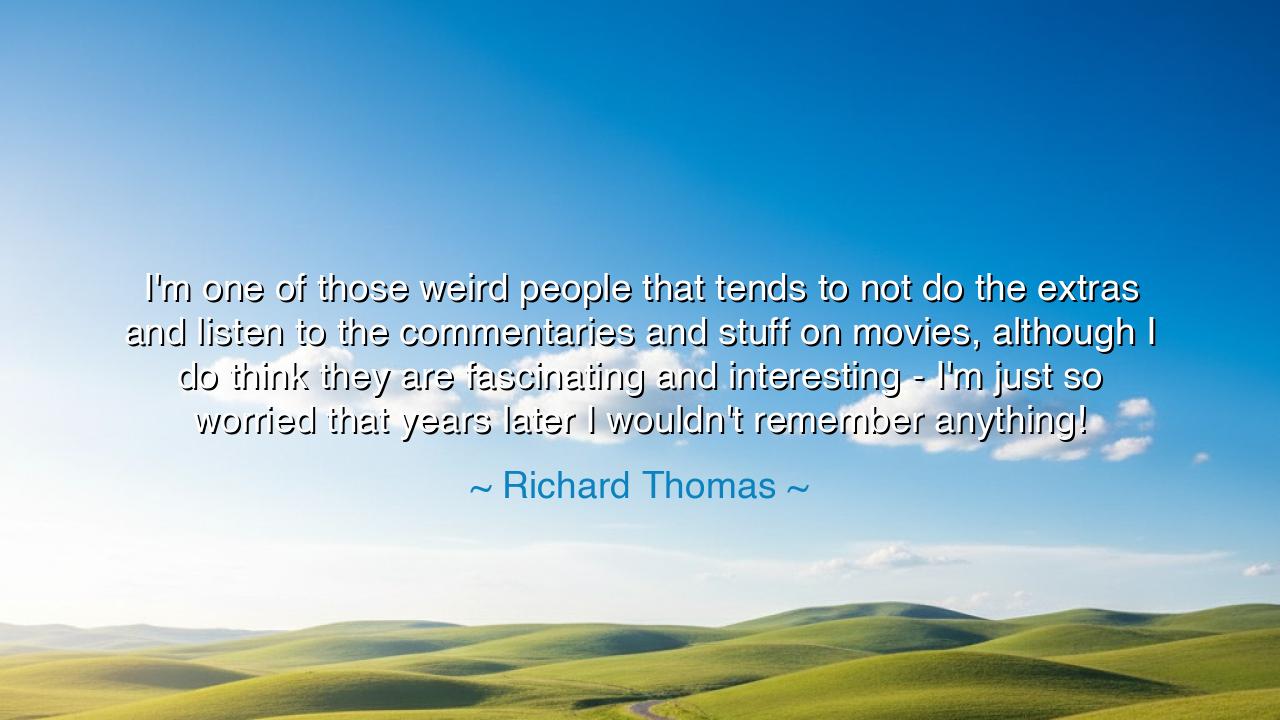
I'm one of those weird people that tends to not do the extras
I'm one of those weird people that tends to not do the extras and listen to the commentaries and stuff on movies, although I do think they are fascinating and interesting - I'm just so worried that years later I wouldn't remember anything!






In the vast flow of time, we are constantly surrounded by knowledge, experiences, and memories—some of which we choose to retain, and others which we fear will slip through our fingers. Richard Thomas, in his reflection, offers a rare insight into the human condition: "I'm one of those weird people that tends to not do the extras and listen to the commentaries and stuff on movies, although I do think they are fascinating and interesting - I'm just so worried that years later I wouldn't remember anything!" This fear, this delicate balance between immersion in the present and the uncertainty of the future, speaks to the heart of our existence: the desire to live fully in the moment, without being overwhelmed by the desire to preserve it for eternity.
Memory, like a river, flows swiftly and is subject to the whims of time. In the ancient world, the great warriors, philosophers, and poets understood that the quest for wisdom was a delicate dance between living the experience and reflecting upon it later. Herodotus, often called the "father of history," chronicled the great events of his time, yet he too recognized that the essence of life could never be fully captured in mere words. Even the greatest minds, such as Plato, feared that the written word would not be sufficient to contain the depth of human thought. Plato's dialogues, though filled with wisdom, were not meant to be mere transcripts but reflections of his belief that true knowledge was found in action—not in the endless commentary, but in living and engaging with the world directly.
The ancient poets, too, knew that the stories they told would fade with time, but it was not the preservation of the details that mattered—it was the emotion and the truth they conveyed in the moment. Consider Homer, who chronicled the Iliad and the Odyssey—two epics filled with the timeless struggles of heroism and fate. Homer’s works were not merely about recounting events in full detail, but about capturing the essence of human experience—the struggles, the triumphs, and the decisions that shape us. In this way, the ancient poets and thinkers embraced the fleeting nature of memory, knowing that it was not the detailed preservation of the past that mattered, but the impact it had on those who experienced it.
In a way, Thomas’s statement reflects this ancient wisdom: he is choosing to live the experience of a movie, rather than merely collecting its facts. By avoiding the commentaries and extras, he acknowledges that while they may provide interesting details, they might detract from the immediacy of the moment. Just as the ancient heroes did not focus on the minutiae of their daily lives but embraced the big battles that defined their stories, Thomas, too, seeks to engage with life—whether in movies or in broader contexts—without becoming encumbered by the desire to preserve every aspect for future analysis.
Yet, in this fear of forgetting, there is a lesson. Memory is often fragmented, fleeting, and imperfect, but it is this very imperfection that makes our lives so precious. The ancient philosophers often debated the nature of time and memory, understanding that what we forget is as important as what we remember. Socrates warned that writing down knowledge would lead to the loss of true wisdom, for the mind would become dependent on the external records rather than the internal reflections that arise from experience. In this way, Thomas’s reluctance to dwell on the extras and commentaries reflects a deeper truth: that experiences themselves are more important than the details we try to hold onto, for it is in the living of life that we find the truth.
From this, we learn that memory is not something to be forced or preserved at the cost of the present moment. The ancients knew that while it is wise to reflect on the past, it is more important to live deeply in the present—to absorb the full force of each experience. The commentaries and extras can sometimes distract us from the essence of what we truly experience. By embracing impermanence, we are reminded to cherish what is immediate, to honor the present, and to understand that our experiences, while fleeting, are infinitely valuable.
So, let us walk our path with purpose and presence. Do not cling too tightly to the details that you think you must remember, for in doing so, you may miss the deeper truths hidden in the moment. Like the ancient philosophers and warriors, live fully in the experience, knowing that what truly matters is not how much we remember, but how deeply we live. Let your life be a story filled with vividness and clarity, for it is the living of that story that will leave its mark, not the commentaries that try to preserve it. Embrace the present, and let it shape your future in ways that no written record ever could.






AAdministratorAdministrator
Welcome, honored guests. Please leave a comment, we will respond soon